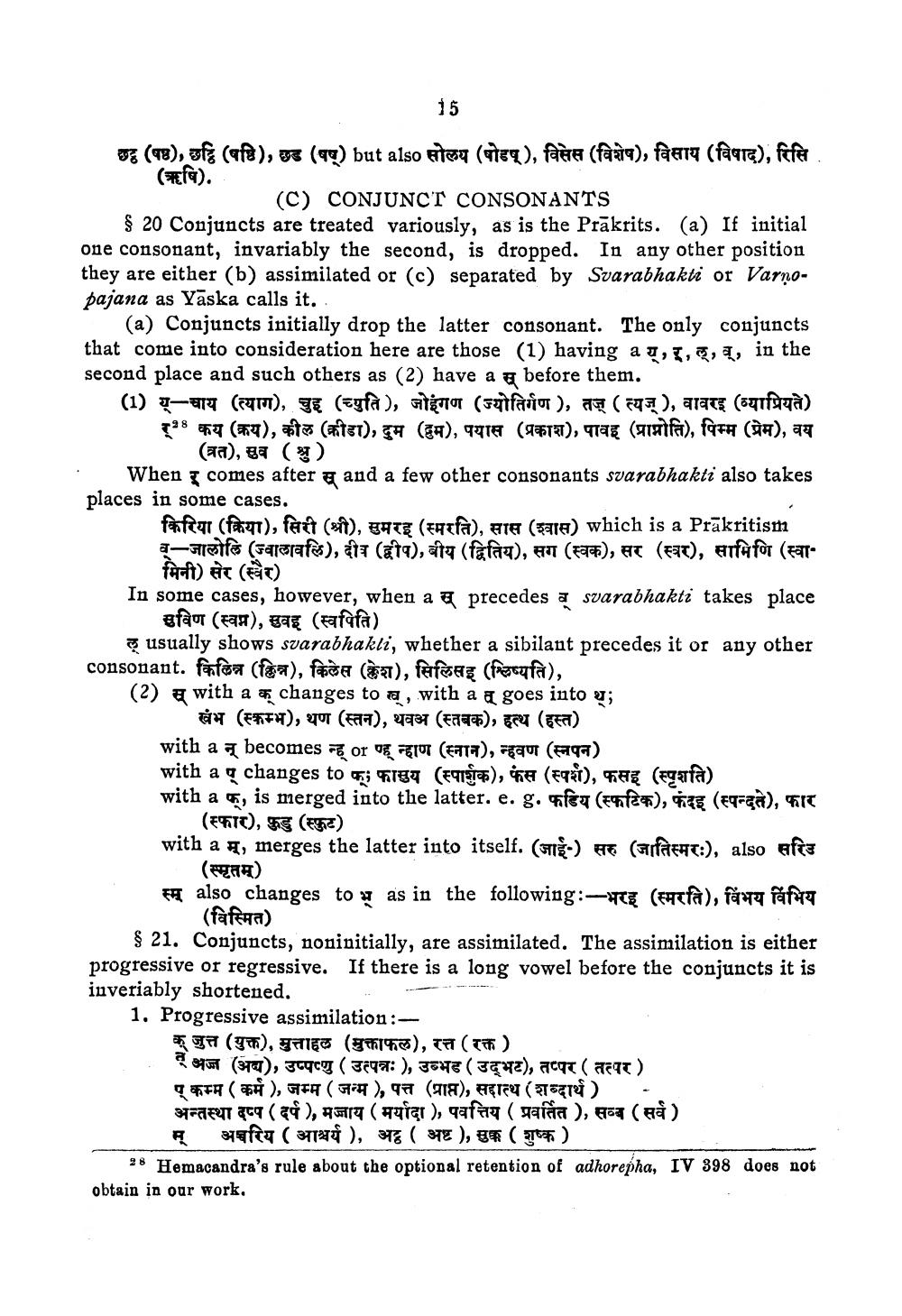________________
15
छह (पट), छढि (पष्ठि), छड (प) but also सोलय (पोडप्), विसेस (विशेष), विसाय (विषाद), रिसि (ऋषि).
(C) CONJUNCT CONSONANTS 820 Conjuncts are treated variously, as is the Prakrits. (a) If initial one consonant, invariably the second, is dropped. In any other position they are either (b) assimilated or (c) separated by Svarabhakti or Varņopajana as Yaska calls it..
(a) Conjuncts initially drop the latter consonant. The only conjuncts that come into consideration here are those (1) having a य,र,ल,व्, in the second place and such others as (2) have a before them. (1) -चाय (त्याग), चुइ (च्युति), जोइंगण (ज्योतिर्गण), तज् (त्यज् ), वावरइ (व्याप्रियते) 18 कय (क्रय), कील (क्रीडा), दुम (दुम), पयास (प्रकाश), पावड (प्राप्नोति), पिम्म (प्रेम), वय
(त), सुव (श्रु) When g comes after a and a few other consonants svarabhakti also takes places in some cases.
किरिया (क्रिया), सिरी (श्री), सुमरइ (स्मरति), सास (श्वास) which is a Prakritism व-जालोलि (ज्वालावलि), दीव (द्वीप), बीय (द्वितिय), सग (स्वक), सर (स्वर), सामिणि (स्वा.
मिनी) सेर (स्वैर) In some cases, however, when a a precedes a svarabhakti takes place
सुविण (स्वप्न), सुवइ (स्वपिति)
usually shows svarabhakli, whether a sibilant precedes it or any other consonant. किलिन्न (क्विन्न), किलेस (क्लेश), सिलिसइ (लिष्यति), (2) with a changes to a , with a a goes into u;
खंभ (स्कम्भ), थण (स्तन), थवअ (स्तबक), हत्थ (हस्त) with a becomes न्हु or ण्ह न्हाण (स्नान), न्हवण (स्नपन) with a changes to फ; फासुय (स्पार्शक), फंस (स्पर्श), फसह (स्पृशति) with a फ, is merged into the latter. e. g. फडिय (स्फटिक), फंदइ (स्पन्दते), फार
(स्फार), फुडु (स्फुट) with a p, merges the latter into itself. (जाई.) सरु (जातिस्मरः), also सरिउ
(स्मृतम्) स्म also changes to v as in the following:-भरइ (स्मरति), विभय विभिय
(विस्मित) $ 21. Conjuncts, noninitially, are assimilated. The assimilation is either progressive or regressive. If there is a long vowel before the conjuncts it is inveriably shortened. 1. Progressive assimilation:
क् जुत्त (युक्त), मुत्ताहल (मुक्ताफल), रत्त (रक्त)
अज (अब), उप्पप्णु (उत्पन्नः), उब्भड (उद्भट), तप्पर (तत्पर) प् कम्म (कर्म), जम्म (जन्म), पत्त (प्राप्त), सदात्थ (शब्दार्थ) अन्तस्था दप्प (दर्प), मजाय (मर्यादा), पवत्तिय (प्रवर्तित), सब (सर्व)
म् अचरिय (आश्चर्य), अह ( अष्ट ), सुक्क (शुष्क) 28 Hemacandra's rule about the optional retention of adhorepha, IV 398 does not obtain in our work,




